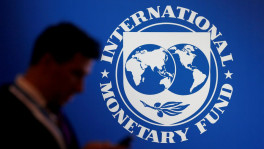Hunger or Coronavirus – Who will get us first?
In the battle between life and livelihood, the informal sector takes the biggest hit

Pearl S. Buck, one of the greatest American novelists of the last century, once said, "A hungry man can't see right or wrong. He just sees food."
In the midday of Ramadan, sitting idle but visibly tired at the backstreet of the local market, it was only the thought of food that rickshaw puller Zafar Mia had in his mind.
He has four mouths to feed at home. But only Tk 150 was all he could manage to earn till the morning.
"For the last one month, my landlord has been asking for rent every day but I will have only Tk 90 left after I pay Tk 60 of Mahajan's daily charge," Zafar Mia said.
"How am I supposed to feed my family? What can I do about my landlord's mounting pressure?" Zafar added as he went on gazing at the makeshift vegetable shops by the road.
Zafar Mia is one of the many people who have lost or are about to lose their livelihoods in the aftermath of the coronavirus pandemic, that broke out in Bangladesh in March and botched its economy.
Bangladesh, however, is not the only country stagnated in this crisis.
Coronavirus pandemic has clutched its claws on more than 180 countries and territories, killed more than 220,000 people, and infected more than three million people globally.
According to a study of the Imperial College London, in the "absence of intervention", Covid-19 would have resulted in 7.7 billion infections and 40 million deaths globally this year.
With appropriate suppressive strategies, however, the Imperial College study says, "95 percent of the deaths could be averted."
Consequently, most of the infected countries have been in complete lockdown for around two months now.
With regular businesses halted due to strict suppressive strategies, the pandemic has created an unprecedented global economic crisis.
Jobs and incomes disappear
Tens of thousands of people are losing their incomes and falling into the trap of impending poverty, as a direct consequence of the economic crisis.
A recent International Labour Organization (ILO) data revealed that because of the coronavirus pandemic, 50 percent of the global workforce may lose their livelihoods, as 1.6 billion workers in the informal economy are at immediate risk of losing their income source.
According to the ILO data, only the first month of the pandemic has resulted in a drop of 60 percent in the income of informal workers globally.
The ILO report about the informal sector being in jeopardy, and the story of second-hand furniture seller Swapan Mandal selling bananas in a makeshift van shop for survival could, however, appendage each other.
Swapan has a small business of secondhand furniture beside Khilgaon rail gate market. When he was forced to halt his business due to the government lockdown in the city, all hell broke loose for Swapan.
In pursuit of survival, he began to sell bananas here and there.
All that keeps Swapan look forward is the hope that "everything will be normal again soon."
From loss of livelihoods to starvation
As thousands of people are losing their income source globally, according to a United Nations and Oxfam International study, half a billion more people could be pushed into poverty.
But the World Food Programme (WFP) portrays an even murkier picture. The WFP has recently warned that around 30 million people could die of starvation.
The WFP issued a global appeal for an additional $350 million, with the already pledged $1.9 billion, for critical funding needed to feed the world's most vulnerable during the coronavirus pandemic.
Like other parts of the world, poverty and starvation as collateral of the coronavirus pandemic didn't take long to get its clutches on Bangladesh.
The South Asian Network on Economic Modelling (SANEM)'s recent study says Covid-19 may double poverty in Bangladesh.
While a Brac survey, published on April 10, says that poverty has risen by 60 percent while 14 percent people have no food at home since the outbreak of coronavirus .
Since the survey was published, things haven't changed for better, if not worse.
On April 21, it was reported that a group of people in Sarail Upazila, Brahmanbaria took position in front of the upazila parishad office demanding food.
The placard that the protestors held read "How long will we starve? Give us food", a reflection of the grim reality.
Following the protests, a local Sramik League leader told The Business Standard that "many residents of ward 6 of Syedtula village have lost their jobs due to the coronavirus. No government relief was given out in our ward."
We could trace truth in his claims about the loss of jobs and income in BGMEA President Rubana Huq's comments on BBC.
A report published by BBC on April 29 quoted the BGMEA President warning that "more than two million garment factory workers might lose their jobs" because of the coronavirus crisis.
Myriads of such stories of layoffs, depression in the informal sector, and alarming future of the economy keep the economists and the concerned authorities wide awake.
But the deadly disease Covid-19 itself doesn't seem to create much anxiety among day the labourers like Rickshaw puller Zafar Mia.
"We don't have time to worry about coronavirus. Hunger will kill us anyway before coronavirus does."
Zafar retorted, but the nonchalance in his look remained all the same.


 Keep updated, follow The Business Standard's Google news channel
Keep updated, follow The Business Standard's Google news channel
















